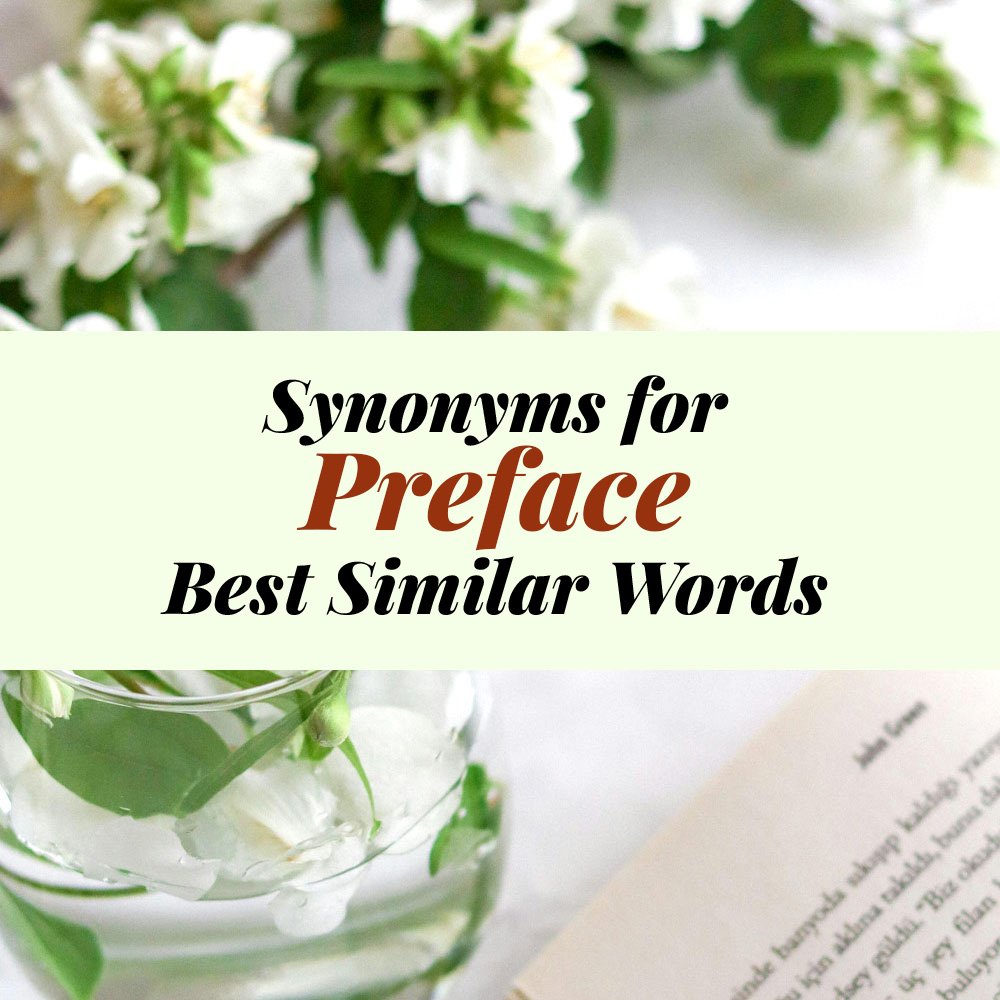A preface is the beginning part of a book, essay, or speech that introduces what the reader will discover inside. Sometimes, people like to use other words that mean the same as preface, such as introduction, prologue, or foreword. These words make writing more interesting and expressive. In this article, we will explore 18 similar words for preface with examples and meanings.
| Synonym | Example |
|---|---|
| Introduction | The introduction gives readers a quick view of the book’s topic. |
| Foreword | The author’s friend wrote the foreword for the novel. |
| Prologue | The story begins with a short prologue set in the past. |
| Opening | The opening of the report explained the main goal. |
| Beginning | The beginning of the paper outlines the main ideas. |
| Prelude | The film’s prelude shows how the main event started. |
| Preliminary | The preliminary section explains key background details. |
| Startup | The startup paragraph introduces the story tone. |
| Initiation | The initiation part sets the base for later chapters. |
| Commencement | The commencement of the speech was short and friendly. |
| Overture | The musical overture introduced the main themes. |
| Prefatory note | The prefatory note thanked those who helped. |
| Preamble | The preamble of the law explains its purpose. |
| Introductory section | The introductory section makes the topic easy to follow. |
| Lead-in | The lead-in paragraph guides readers smoothly. |
| Advance statement | The writer gave an advance statement to explain the purpose. |
| Exordium | The exordium of the essay created interest. |
| Opening remarks | The opening remarks welcomed everyone warmly. |
18 Different Ways to Say PREFACE: Another Word for PREFACE
1. Introduction
The word introduction is one of the most common and useful words to replace preface. It fits in books, essays, and speeches. You can use it when you want to give readers or listeners a short view of what is coming next. An introduction sets the stage for the main part and helps people understand what to expect. It is a friendly and direct way to start any writing. It also connects the reader with the writer’s thoughts and goals. You can use it in both formal and informal works. It works perfectly for school papers, research, or novels.
- The introduction tells us what the book will discuss.
- She wrote a short introduction to explain her topic.
- Every report needs a strong introduction at the start.
- The introduction helps readers get ready for the main story.
2. Foreword
Foreword is another fine word for preface. It often appears in books, especially nonfiction ones. A foreword is usually written by someone other than the author. It talks about the book, the author, or the reason for writing. You can use it when you want to show respect or add importance to the work. A foreword helps readers feel connected and gives them extra insight. It is short, polite, and full of appreciation. Many writers use it to thank others or explain how the work came to life. It makes a warm and trustworthy opening.
- The book’s foreword was written by a famous scholar.
- In the foreword, he praised the writer’s hard work.
- The foreword gave helpful background information.
- Readers often enjoy reading the foreword first.
3. Prologue
A prologue is mostly used in stories, plays, or movies. It means a part that comes before the main story. You can use it when you want to give background information or describe events that happened earlier. A prologue helps people understand the setting and mood. It also makes them curious about what will happen next. It’s a perfect word to use when starting something creative or dramatic. You can write a prologue to give hints, secrets, or emotional depth to the story. It prepares the reader in an artistic and interesting way.
- The prologue describes the hero’s childhood.
- In the prologue, the war between kingdoms begins.
- The prologue helps the audience understand the plot.
- The movie started with a dark and exciting prologue.
4. Opening
Opening is a simple and flexible word that can easily replace preface. It refers to the first part of any writing, talk, or show. You can use it when you want to describe how something begins. The opening sets the tone for what follows. It is a strong word for both creative and formal works. A good opening catches attention and builds interest right away. It can include greetings, ideas, or a short background. It helps readers feel ready for the main section.
- The opening gives a short summary of the main topic.
- The report’s opening paragraph is well written.
- The opening of the story introduces the main character.
- Everyone liked the speaker’s friendly opening.
5. Beginning
The word beginning is a basic and clear synonym for preface. It fits almost anywhere, from essays to novels. You can use it when you want to describe the early part of something. A beginning helps to start a journey or idea. It gives a strong first impression. You can use it when your goal is to create interest and clarity. The beginning often shows what is most important and sets the reader’s mood. It is a good word for both students and writers who want to write naturally and smoothly.
- The beginning of the essay talks about the main problem.
- He changed the beginning to make it more interesting.
- The beginning part was full of emotion and hope.
- Every good story needs a powerful beginning.
6. Prelude
A prelude is a beautiful word that means something that comes before the main event. It often appears in music, writing, or performances. You can use it to replace preface when you want a stylish or creative touch. It prepares people for what is to come. A prelude can be short but full of meaning. It gives a feeling of something about to happen. Writers use it to build excitement or mystery. It is an elegant choice for poetry, novels, or speeches that need a smooth start.
- The prelude of the play sets the time and place.
- The song’s prelude creates a calm mood.
- The prelude gives clues about the next scene.
- In the prelude, the writer explains his inspiration.
7. Preliminary
The word preliminary means something that happens before the main part. It can replace preface when writing formal reports or research papers. You can use it when explaining background details or basic ideas before the full discussion. It gives a sense of order and planning. A preliminary part helps readers or listeners get the main idea step by step. It shows that something bigger or deeper will follow. It’s perfect for studies, business writing, or presentations that need structure.
- The preliminary chapter shares important background facts.
- The researcher gave a preliminary report before the final one.
- The preliminary notes help readers prepare for complex ideas.
- The preliminary text acts as a short preface.
8. Startup
Startup can also act as a synonym for preface when talking about beginnings or first parts. It is more informal and modern. You can use it when you want to describe the first stage of an idea, speech, or story. It shows action and movement. A startup paragraph helps to begin smoothly and attract attention. It gives readers a preview of what is next. It’s a great choice for blogs, speeches, or creative work where you want to sound friendly and lively.
- The startup paragraph gives the main idea.
- At the startup of the story, we meet the main hero.
- The writer made the startup very short but clear.
- The startup helps readers understand the goal early.
9. Initiation
Initiation means the start or introduction of something important. It can be used as a formal synonym for preface, especially in academic or professional writing. You can use it to show the first step of a plan, idea, or story. It gives a sense of purpose and movement. When used well, initiation feels serious and thoughtful. It tells readers that they are beginning a meaningful journey through the content. It is perfect for reports, studies, or long writings.
- The initiation part presents the main goal.
- At the initiation, the writer explains the reason for the project.
- The initiation introduces all key points briefly.
- Readers find the initiation part clear and strong.
10. Commencement
The word commencement means the act of starting something. It can be a fine replacement for preface when you want a more formal or elegant tone. Commencement is used often in speeches and writing where the start feels special. It marks the opening moment and sets a professional tone. It works well in ceremonies, essays, and books. It makes the beginning sound meaningful and official. Using this word gives your writing a polished feel.
- The commencement of the speech made everyone smile.
- The commencement marks a new beginning.
- The writer’s commencement gives energy to the topic.
- Readers liked the smooth commencement of the essay.
11. Overture
An overture is a lovely synonym for preface, especially in music or theater. It means an opening section that prepares people for what’s coming. It can also mean a friendly introduction before a main idea or event. You can use it when you want your start to feel creative or emotional. An overture builds interest and harmony. It can be soft or powerful depending on the mood you want to create. It helps set the rhythm and feeling of your work.
- The overture of the play fills the room with joy.
- The book begins with a gentle overture.
- The overture prepares the reader for the main story.
- The writer’s overture gives warmth and grace.
12. Prefatory Note
A prefatory note is a formal phrase used to mean preface. It’s often used when you want to say something polite or explain the background of your work. It is short and professional. You can use it when writing reports, books, or academic papers. It’s a good place to thank others or share your aim. A prefatory note makes writing look careful and respectful. It tells the reader why the work matters before they begin reading deeply.
- The author added a short prefatory note.
- The prefatory note thanks those who supported the project.
- Readers often read the prefatory note to know the reason behind the book.
- The prefatory note sets the mood for the whole work.
13. Preamble
Preamble is a strong synonym for preface that gives a formal start. It is often used in laws, speeches, or official documents. You can use it when you want to explain the purpose or reason before the main text. It adds seriousness and structure. A preamble helps readers understand the importance of what follows. It also shows the background or vision of the writer. It’s a powerful word that adds weight and order to any piece of writing.
- The preamble explains the goal of the new rule.
- The speech begins with a short preamble.
- The preamble gives meaning to the rest of the writing.
- The writer’s preamble outlines key values.
14. Introductory Section
An introductory section is another clear way to say preface. It is used often in reports, manuals, or long essays. You can use it when you want to start with clarity and purpose. This section helps readers get the background, focus, and aim of the work. It builds connection and gives a calm, professional start. It can include summaries or brief notes before the main discussion. It’s easy to understand and fits almost every kind of writing.
- The introductory section explains the topic’s importance.
- Readers find the introductory section very useful.
- The writer included data in the introductory section.
- The introductory section makes the rest of the paper easier to follow.
15. Lead-in
A lead-in is a short and smooth part that introduces the main topic. It’s a friendly synonym for preface, often used in blogs, talks, or creative works. You can use it to make readers feel comfortable before deep reading begins. It’s short but full of purpose. A good lead-in connects ideas and gives a sense of flow. It also helps to build curiosity and guide attention naturally toward the next section.
- The lead-in paragraph welcomes readers nicely.
- The writer used a clever lead-in to start the article.
- The lead-in connects the story with the introduction.
- Readers enjoy a short and catchy lead-in.
16. Advance Statement
An advance statement is a thoughtful synonym for preface. It means giving a short message before the main part starts. You can use it when you want to prepare readers for what they will read or hear. It helps to share aims, ideas, or reasons behind the work. It’s often used in official or academic settings. An advance statement gives a professional feeling and helps the audience understand what’s coming next.
- The writer made an advance statement about the book’s topic.
- The advance statement explains the goals of the research.
- The advance statement gives readers a short overview.
- The speech starts with a nice advance statement.
17. Exordium
Exordium is a classical and elegant word meaning preface or introduction. It was used in old speeches and writings to mean the first section before the main argument. You can use it when you want to sound thoughtful and traditional. An exordium helps attract attention and build trust at the start. It gives a grand and serious feel to the work. It’s perfect for speeches, essays, or writings that want to sound respectful and wise.
- The exordium of the speech caught everyone’s interest.
- The writer’s exordium showed great care in writing.
- The exordium gives a smooth start to the discussion.
- The exordium helped set the right mood.
18. Opening Remarks
Opening remarks is a friendly and modern phrase for preface. It is often used in speeches, meetings, and presentations. You can use it when you want to greet, thank, or introduce the main idea before starting. It sets a warm and polite tone. Opening remarks make people feel welcomed and ready. It’s a very useful phrase for both formal and informal events. It helps to connect with the audience from the very first moment.
- The host’s opening remarks were kind and short.
- Her opening remarks gave everyone a clear idea of the event.
- The opening remarks made the audience smile.
- The teacher began the talk with brief opening remarks.

Final Thoughts
Using different words for preface makes your writing richer and more expressive. Each synonym adds a special feeling—some sound formal, others sound creative or friendly. Try these 18 synonyms in your next writing to make every beginning stand out and capture attention beautifully.









